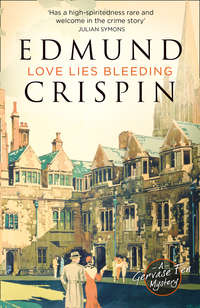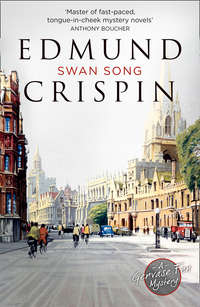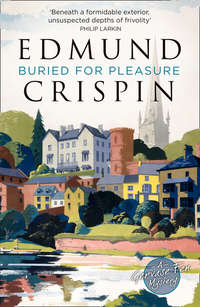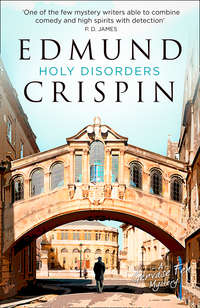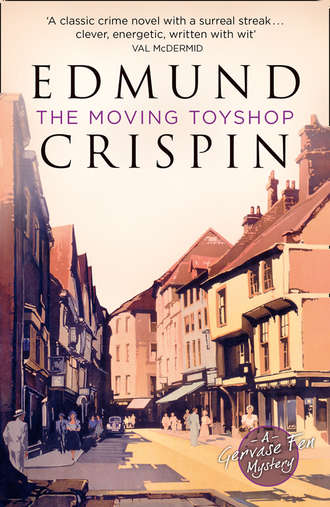
Полная версия
The Moving Toyshop
But yet again, there was no sound.
This is ridiculous, Cadogan told himself severely. The front rooms are probably the living-rooms. You will enter one of these and make certain nothing is wrong. After that, honour will be satisfied, and you can beat a retreat as quickly as may be.
Nerving himself, he crept forward and turned the knob of one of the doors. The small white circle of his torch played on tightly closed curtains, a cheap lacquered sideboard, a wireless set, a table, uncomfortable leather armchairs with big, garish, mauve and orange cushions in satin; there were no pictures on the papered walls. A living-room, certainly. But there was something more, which caused him to breathe an audible sigh of relief and relax a little. The musty smell and the dust which lay thick on everything, showed that the flat had not been occupied for some time. He stepped forward, tripped on something, and shone his torch down on it. Then he whistled softly and said ‘Well, well,’ several times.
For what lay on the floor was the body of an elderly woman, and there was no doubt that she was very dead indeed.
He was curiously unsurprised: the spectre had been laid, the mysterious attraction of the deserted toyshop exorcized and explained. Then he checked himself; the appearance of the body which lay there was no occasion for random analyses. Becoming conscious that the torch was an encumbrance, he stepped back and tried the light switch by the door, but no light resulted, for the bulb was not in place under its cheap frilly shade. Hadn’t he seen a candle on the table in the passage? Yes, it was still there, and it was the work of a moment to light it. He left his torch on the table and returned to the living-room, setting the candle down by the woman’s body.
It lay on the right side, with the left arm flung backwards beneath the table, and the legs stretched out. A woman of near sixty, he judged, for the hair was almost wholly grey and the skin of the hands wrinkled and brown. She was dressed in a tweed coat and skirt and a white blouse, which emphasized her plumpness, with rough wool stockings and brown shoes. There was no ring on her left hand, and the flatness of her breasts had already suggested that she was unmarried. Near her, in the shadow of the table, lay something white. Cadogan picked it up, and found it was a scrap of paper with a number pencilled on it in a sloping feminine hand. This paper, after a brief glance, he slipped in his pocket. Then he looked back at the woman’s face.
It was not a pleasant sight, since it was discoloured a blackish purple, as were her finger-nails. There was froth at the corner of her mouth, which hung open, showing a gold stopping which winked in the candlelight. In her neck was embedded a thin cord, tied fast behind. It had sunk so deep that the flesh which closed over it made it almost invisible. There was a pool of dried blood on the floor by the head, and Cadogan found the reason for it in a sharp contusion just below the crown. He felt the bone of the skull, but as far as he could tell it was not fractured.
Up to now he had experienced only the passionless curiosity of a child, but the action of touching her brought a sudden revulsion of feeling. He wiped the blood quickly from his fingers and stood up. He must get to the police as quickly as possible. Anything else to be observed? Ah, yes, a gold pince-nez, broken, on the floor nearby…And then, abruptly he stiffened, his nerves tingling like charged electric wires.
There had been a sound in the passage outside.
It was a small sound, an indefinite sound, but it made his heart beat violently and his hand tremble. Oddly enough, it had not previously occurred to him that the person who had killed this woman might be still in the house. Turning his head, he looked steadily out of the half-open door into the darkness beyond, and waited, absolutely motionless. The sound did not recur. In that dead stillness the watch on his wrist sounded as loud as a kitchen alarm-clock. He realized that if anyone were there it was going to be a matter of endurance and nerves: whichever moved first would give the other the advantage. The minutes passed – three, five, seven, nine – like aeons of cosmic time. And reason began officiously to interfere. A sound? Well, what of it? The house, like Prospero’s isle, was full of noises. And in any case, what purpose was being served by standing in an unnatural attitude like a waxwork? The aching muscles added their cry, and at last he moved, taking the candle from the table and peering, with infinite precautions, into the passage.
It was empty. The other doors were still shut. His torch stood on the table where he had left it. In any case, the thing to do was to get out of this detestable house as quickly as possible, and so on to the police station. He picked up his torch, blew out the candle, and put it down. A flick of the button, and…
No light came.
Savagely, uselessly, Cadogan wrestled for perhaps half a minute with the switch, until at last he realized what was the matter: the thing weighed too light in his hand. With a sick premonition he unscrewed the end and felt for the battery. It had gone.
Trapped in the pitch blackness of that musty-smelling passage, his self-control suddenly failed. He knew there was a soft, padding step coming towards him. He knew that he threw the empty torch blindly, and heard it strike the wall. And he sensed, rather than saw, the blazing beam of light which shone out from behind. Then there was a dull, enormous concussion, his head seemed to explode in a flare of blinding scarlet, and there was nothing but a high screaming like the wind in wires and a bright green globe that fell twisting and diminishing, to annihilation in inky darkness.
He awoke with his head aching and a dry, foul mouth, and after a moment staggered to his feet. There was a rush of nausea and he clung to the wall, muttering stupidly to himself. In a little while his head cleared and he was able to look about him. The room was small, scarcely more than a closet, and contained a miscellaneous collection of cleaning things – a pail, a rag mop, brushes, and a tin of polish. A faint light glowing through the small window made him look at his watch. Half past five: unconscious four hours, and now it was nearly dawn. Feeling a little better, he cautiously tried the door. It was locked. But the window – he stared – the window was not only unlocked, but open. With difficulty he climbed on to a packing-case and looked out. He was on the ground floor, and beyond him was a deserted and neglected strip of garden, with creosoted wooden fences running down on either side and a gate, standing ajar, at the bottom. Even in his weakened condition it was easy to climb out. Once outside the gate the nausea seized him again, the saliva flowed into his mouth, and he was violently sick. But he felt better for it.
A turn to the left, and he was at an alleyway which brought him back into the road down which he had walked four hours before – yes, unmistakably it was the same road, and he was three shops away from the toyshop – he had counted – on the side nearest Magdalen Bridge. Pausing only to notice landmarks and fix the position in his mind, he hurried off towards the town and the police station. The growing light showed him a plate which bore the words IFFLEY ROAD, as he came out at a road-junction where there was a stone horse-trough. So that was it. Then Magdalen Bridge, grey and broad, and safety. He looked back and saw that he was not being followed.
Oxford rises late, except on May morning, and the only person at large was a milkman. He stared very blankly indeed at the bloodied and dishevelled figure of Richard Cadogan, staggering up the long curve of the High Street; and then, presumably, dismissed him as a belated reveller. The grey freshness of the new day washed the walls of the Queen’s and University College. Last night’s moon was a lustreless coin pasted on the morning sky. The air was cool and grateful to the skin.
Cadogan’s head, if still aching abominably, now at least permitted him to think. The police station, he seemed to remember, was in St Aldate’s, somewhere near the post office and the town hall, and it was in that direction that he was heading now. One thing puzzled him. He had found in his pocket his torch, complete with battery, and what was more, his wallet, with Mr Spode’s cheque, still perfectly safe. A considerate assailant, evidently…Then he remembered the old woman with the cord tight round her neck, and was not so pleased.
The police were courteous and kind. They listened to his rather incoherent story without interruption, and asked a few supplementary questions about himself. Then the sergeant in charge of the night shift, a substantial red-faced man with a wide black moustache, said:
‘Well, sir, the best thing we can do now is to get that crack on the head dressed and give you a cup of hot tea and some aspirin. You must be pretty much under the weather.’
Cadogan was slightly annoyed at his failure to grasp the urgency of the situation. ‘Oughtn’t I to take you back there at once?’
‘Well, now. If you were out four hours, as you say, I don’t expect they’ll have left the body lying there conveniently for us, as you might say. The rooms above aren’t occupied, then?’
‘I don’t think so.’
‘No. Well, that means we can easily get there before they open the shop, and have a look round. Curtis, clean up the gentleman’s head and put a bandage on it. Here’s your tea, sir, and your aspirin. You’ll feel better for the rest.’
He was right. Cadogan felt better not only for the rest and the tea and the ointment on his bruised skull, but also for the cheerful solidity of his companions. He thought a little wryly of the craving for excitement upon which, the evening before, he had discoursed to Mr Spode in the garden at St John’s Wood. There had been quite enough of it, he decided: quite enough. It is perhaps fortunate that he did not know what was still in store.
It was full daylight, and the multitudinous clocks of Oxford were chiming 6.30, when they got into the police car and drove back down the High Street. The milkman, still on his rounds, shook his head with mournful resignation on seeing Richard Cadogan, turbaned like an oriental potentate with his bandages, sitting in the middle of a police escort. But Cadogan did not observe him. He was taking a moment off from consideration of the lethal toyshop to enjoy being in Oxford. He had scarcely had time to look around him previously, but now rushing smoothly amid noble prospects down to the high tower of Magdalen, he drew a deep breath of sheer pleasure at the place. Why – why in heaven’s name did he not live here? And it was going to be another fine day.
They crossed the bridge, reached the road-junction where the horse-trough stood, and plunged into the Iffley Road. Staring along it:
‘Hello,’ said Cadogan, ‘they’ve put the awning up.’
‘You’re sure of the place, sir?’
‘Yes, of course. It’s opposite a red-brick church of some kind – Nonconformist, I think.’
‘Ah yes, sir. That’ll be the Baptist Church.’
‘All right, driver. You can pull up now,’ said Cadogan excitedly. ‘There’s the church on our right, there’s the alley-way I came out of and there—’
The police car drew into the kerb. Half rising in his seat, Cadogan stopped and stared. In front of him, its window loaded with tins, flour, bowls of rice and lentils, bacon, and other groceries in noble array, was a shop bearing the legend:
WINKWORTH
FAMILY GROCER AND PROVISION MERCHANT
He gazed wildly to right and left. A chemist’s and a draper’s. Farther on to the right, a butcher, a baker, a stationery shop; and to the left, a corn merchant, a hat shop, and another chemist…
The toyshop had gone.
2
The Episode of the Dubious Don
Out of the grey light came a gold morning. The leaves were beginning to fall from the trees in the Parks and in St Giles’, but they still made a brave show of bronze and yellow and malt-brown. The grey maze of Oxford – from the air, it resembles nothing so much as a maze – began to stir itself. The women undergraduates were the first abroad – cycling along the streets in droves, absurdly gowned and clutching complicated files, or hovering about libraries until the doors should be open and admit them once again to study the divine mysteries which hang about the Christian element in Beowulf, the date of the Urtristan (if any), the complexities of hydrodynamics, the kinetic theory of gases, the law of tort, or the situation and purposes of the parathyroid gland. The men rose more circumspectly, putting a pair of trousers, a coat, and a scarf over their pyjamas, shambling across quadrangles to sign lists, and shambling back to bed again. Art students emerged, subduing the flesh in their endeavour to find a good light, elusive and nearly as unattainable as the Grail itself. Commercial Oxford, too, awoke; shops opened and buses ran; the streets were thronged with traffic. All over the city, in colleges and belfries, the mechanism of clocks whirred, clanged, and struck nine o’clock, in a maddening, jagged syncopation of conflicting tempo and timbre.
A red object shot down the Woodstock Road.
It was an extremely small, vociferous, and battered sports car. Across its bonnet were scrawled in large white letters the words LILY CHRISTINE III. A steatopygic nude in chromium leaned forward at a dangerous angle from the radiator cap. It reached the junction of Woodstock and Banbury roads, turned sharply to the left, and entered the private road which runs up beside the college of St Christopher, patron saint of travellers (for the benefit of the uninitiated, it should here be said that St Christopher’s stands next door to St John’s). It then turned in at a wrought-iron gate and proceeded at about forty miles an hour down a short gravel drive which was bordered with lawns and rhododendron bushes and which terminated in a sort of half-hearted loop where it was just impossible conveniently to turn a car. It was evident that the driver had his vehicle under only imperfect control. He was wrestling desperately with the levers. The car made directly for the window where the President of the college, a thin, demure man of mildly epicurean tastes, was sunning himself. Perceiving his peril, he retreated in panic haste. But the car missed the wall of his lodging and fled on up to the end of the drive, where the driver, with a tremendous swerve of the wheel and some damage to the grass borders, succeeded in turning it completely round. At this point there seemed to be nothing to stop his rushing back the way he had come, but unhappily, in righting the wheel, he pulled it over too far, and the car thundered across a strip of lawn, buried its nose in a large rhododendron bush, choked, stalled, and stopped.
Its driver got out and gazed at it with some severity. While he was doing this it backfired suddenly – a tremendous report, a backfire to end all backfires. He frowned, took a hammer from the back seat, opened the bonnet and hit something inside. Then he closed the bonnet again and resumed his seat. The engine started and the car went into reverse with a colossal jolt and began racing backwards towards the President’s Lodging. The President, who had returned to the window and was gazing at this scene with a horrid fascination, retired again, with scarcely less haste than before. The driver looked over his shoulder, and saw the President’s Lodging towering above him, like a liner above a motor-boat. Without hesitation, he changed into forward gear. The car uttered a terrible shriek, shuddered like a man smitten with the ague, and stopped; after a moment it emitted its inexplicable valedictory backfire. With dignity the driver put on the brake, climbed out, and took a brief-case from the back seat.
At the cessation of noise the President had approached his window again. He now flung it open.
‘My dear Fen,’ he expostulated. ‘I’m glad you have left us a little of the college to carry on with. I feared you were about to demolish it utterly.’
‘Oh? Did you? Did you?’ said the driver. His voice was cheerful and slightly nasal. ‘You needn’t have worried, Mr President. I had it under perfect control. There’s something the matter with the engine, that’s all. I can’t think why it makes that noise after it’s stopped. I’ve tried everything for it.’
‘And I see no real necessity,’ said the President peevishly, ‘for you to bring your car into the grounds at all.’ He slammed the window shut, but without any real annoyance. The eccentricities of Gervase Fen, Professor of English Language and Literature and Fellow of St Christopher’s, were not on the traditional donnish pattern. But they were suffered more or less gladly by his colleagues, who knew that any treatment of Fen at his face value resulted generally in their own discomfiture.
Fen strode with great energy across the lawn, passed through a gate in a mellow brick wall against which, in their season, the peaches bloomed, and entered the main garden of the college. He was a tall, lanky man, about forty years of age, with a cheerful, lean, ruddy, clean-shaven face. His dark hair, sedulously plastered down with water, stuck up in spikes at the crown. He had on an enormous raincoat and carried an extraordinary hat.
‘Ah, Mr Hoskins,’ he said to an undergraduate who was perambulating the lawn with his arm round the waist of an attractive girl. ‘Hard at it already, I see.’
Mr Hoskins, large, raw-boned and melancholy, a little like a Thurber dog, blinked mildly. ‘Good morning, sir,’ he said. Fen passed on. ‘Don’t be alarmed, Janice,’ said Mr Hoskins to his companion. ‘Look what I’ve got for you.’ He felt in the pocket of his coat and produced a big box of chocolates.
Meanwhile Fen proceeded into an open passage-way, stone-paved, which led from the gardens into the south quadrangle of the college, turned into a doorway on the right, passed the organ scholar’s room, ran up a flight of carpeted stairs to the first floor, and entered his study. It was a long, light room which looked out on the Inigo Jones quadrangle on one side and the gardens on the other. The walls were cream, the curtains and carpet dark green. There were rows of books on the low shelves, Chinese miniatures on the walls, and a few rather dilapidated plaques and busts of English writers on the mantelpiece. A large, untidy flat-topped desk, with two telephones, stood against the windows of the north wall.
And in one of the luxurious armchairs sat Richard Cadogan, his face wearing the look of a hunted man.
‘Well, Gervase,’ he said in a colourless voice, ‘it’s a long time since we were undergraduates together.’
‘Good God,’ said Fen, shocked. ‘You’re Richard Cadogan.’
‘Yes.’
‘Well, of course you’re very welcome, but you’ve arrived at rather an awkward time…’
‘You’re as unmannerly as ever.’
Fen perched on the edge of the desk, his face eloquent of pained surprise. ‘What an extraordinary thing to say. Have I ever said an unkind word—’
‘It was you who wrote about the first poems I ever published: “This is a book everyone can afford to be without.”’
‘Ha!’ said Fen, pleased. ‘Very pithy I was in those days. Well, how are you, my dear fellow?’
‘Terrible. Of course you weren’t a professor when I saw you last. The University had more sense.’
‘I became a professor,’ Fen answered firmly, ‘because of my tremendous scholarly abilities and my acute and powerful mind.’
‘You wrote to me at the time that it was only a matter of pulling a few moth-eaten strings.’
‘Oh, did I?’ said Fen uneasily. ‘Well, never mind all that now. Have you had breakfast?’
‘Yes, I had it in hall.’
‘Well, have a cigarette, then.’
‘Thanks…Gervase, I’ve lost a toyshop.’
Gervase Fen stared. As he offered his lighter, his face assumed an expression of the greatest caution. ‘Would you mind explaining that curious utterance?’ he asked.
Cadogan explained. He explained at great length. He explained with a sense of righteous indignation and frustration of spirit.
‘We combed the neighbourhood,’ he said bitterly. ‘And do you know, there isn’t a toyshop anywhere there. We asked people who had lived there all their lives and they’d never heard of such a thing. And yet I’m certain I got the place right. A grocer, I ask you! We went inside, and it certainly was a grocer, and the door didn’t squeak either; but then there is such a thing as oil.’ He referred to this mineral without much confidence. ‘And on the other hand, there was that door at the back exactly as I’d seen it. Still, I found out that all the shops in that row are built on exactly the same plan.
‘But it was the police that were so awful,’ he moaned in conclusion. ‘It wasn’t that they were nasty or anything like that. They were just horribly kind, the way you are to people who haven’t long to live. When they thought I wasn’t listening they talked about concussion. The trouble was, you see, that everything looked so different in daylight, and I suppose I hesitated and expressed doubts and made mistakes and contradicted myself. Anyway, they drove me back to St Aldate’s and advised me to see a doctor, so I left them and came and had breakfast here. And here I am.’
‘I suppose,’ said Fen dubiously, ‘that you didn’t go upstairs at this grocery place?’
‘Oh, yes, I forgot to mention that. We did. There was no body, of course, and it was all quite different. That is, the stairs and passage were carpeted, and it was all clean and airy, and the furniture was covered with dust sheets, and the sitting-room was quite different from the room I’d been in. I think it was at that point that the police really became convinced I was crazy.’ Cadogan brooded over a sense of insufferable wrong.
‘Well,’ said Fen carefully, ‘assuming that this tale isn’t the product of a deranged mind—’
‘I am perfectly sane.’
‘Don’t bawl at me, my dear fellow.’ Fen was pained.
‘Of course, I don’t blame the police for thinking I was mad,’ said Cadogan in tones of the most vicious reprehension.
‘And assuming,’ Fen proceeded with aggravating calm, ‘that toyshops in the Iffley Road do not just take wing into the ether, leaving no gap behind: what could inspire anyone to substitute a grocery shop for a toyshop at dead of night?’
Cadogan snorted. ‘Perfectly obvious. They knew I’d seen the body, and they wanted people to think I was mad when I told them about it – which they’ve succeeded in doing. The crack on the head could be produced as the reason for my delusions. And the window of the closet was left open deliberately, so that I could get out.’
Fen gazed at him kindly. ‘Very nice, as far as it goes,’ he said. ‘But it doesn’t explain the fundamental mystery of the business – why the grocery shop was turned into a toyshop in the first place.’
Cadogan had not thought of this.
‘You see,’ Fen continued, ‘they couldn’t have known you were going to blunder in. You’re the fly in the ointment. The groceries were removed, and the toys substituted, for some entirely different purpose. Then they had to be switched back again, in any case.’
Something like relief was coming back to Cadogan’s mind. For a while he almost wondered if he were, in fact, suffering from delusions. Belying all outward appearance, there was something extremely reliable about Fen. Cadogan assembled his sharp-cut, supercilious features into a frown.
‘But why?’ he asked.
‘I can think of several good reasons,’ said Fen gloomily. ‘But they’re probably all wrong.’
Cadogan stubbed out his cigarette and groped for a fresh one. As he did so his fingers came in contact with the scrap of paper he had picked up near the body. He was astonished to realize that he had forgotten all about it until this moment.
‘Here!’ he cried excitedly, pulling it out of his pocket. ‘Look! Tangible proof. I picked this up by the body. I didn’t remember I had it. I’d better go back to the police.’ He half rose, in some agitation, from his chair.


